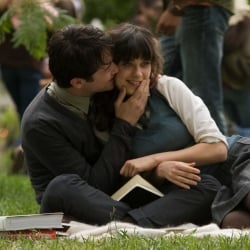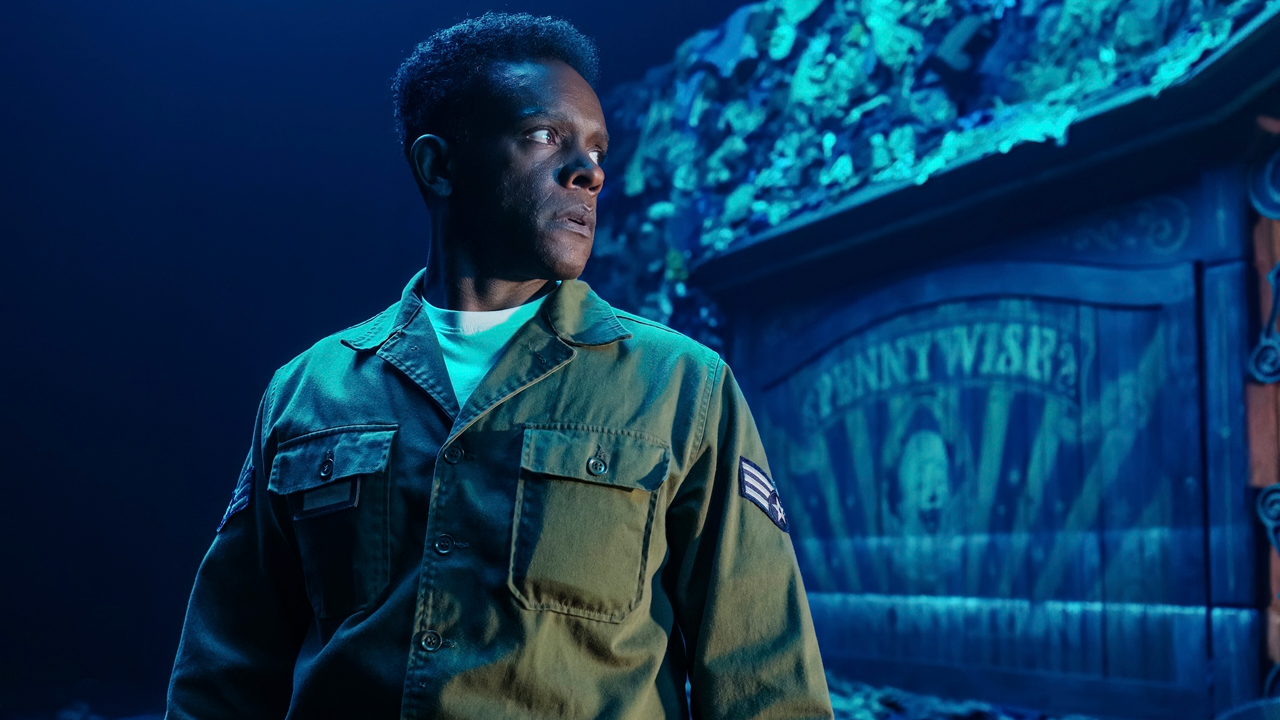Exclusive Interview: 500 Days Of Summer Screenwriters

Everyone knows how to tell a relationship story and a breakup story-- we've all been there. But how do you tell that same story, the same elements of early love and then eventual heartbreak, in a way that seems fresh? Scott Neustadter and Michael Weber cracked the code when they wrote 500 Days of Summer, a story about a young man (Joseph Gordon-Levitt) and a young woman (Zooey Deschanel) whose relationship works great until it goes all wrong.
And as hard as I tried, I never really did figure out exactly how they did it, how they knew how to shuffle the scenes of their narrative so the breakup comes first and the meet-cute comes 10 minutes later. I guess the answer is that they're just that good. Read below for my interview with the guys, how Scott wanted to write the story after a particularly nasty breakup of his own, how Michael kept the screenplay from just being a diatribe about Scott's ex, and how both of them figured out how to make a dance number work in a modern day movie that isn't a musical. 500 Days of Summer opens today, and by now, after all the raves, you should definitely have bought your tickets already.
What made you guys realize you wanted to write stuff together?
Scott: I think we always sort of wanted to do it. I didn't think I could do it, and I went to work in development. The more scripts you read that aren't terrific, the more you think 'Really? That's all you have to do? OK.' And we met there-- I hired him as my intern, true story. We were terrible at our jobs. We used to go up to the roof and make each other laugh and tell stories. I don't know what the impetus was to start writing them down, but eventually we did. I went to England, and that's sort of where I met this character [that Summer is based on], completely fictional of course. We finally had the relationship we always wanted to write about. I was like, dude, we have to write about this thing that's just happened to me, I don't understand it.
Michael: I was first and foremost there for him as a friend, but then soon after, [I thought] we should be writing this down. The things we were talking about, and the way any of us can sit down and talk about our relationship war stories, were more interesting and funnier and more heartfelt than most of the romantic comedies we were seeing in theaters. We essentially wanted to write the movie we wanted to see.
How much bad, awful stuff did you get out that was clearly coming out of pain, not of storytelling?
Scott: I recommend that everyone coming out of a breakup starts writing it.
Your Daily Blend of Entertainment News
Michael: I had to be the sounding board, like, 'We can't do the scene where Tom throws darts at Summer. We can't do that.'
Scott: It was a cathartic thing for sure. We probably set out to really villify this person, like 'How dare you break up with me.' And then as we were sort of writing it, and everything else, I think what was kind of cool was the discovery that she really didn't do anything wrong, and she's not a villain, and it's a shame that she didn't feel the same, but we've probably all been there too.
Michael: We've all been Tom, and we've all been Summer. I don't know which is worse.
Scott: This is a coming of age story masquerading as a romantic comedy, as we like to say.
Were you ever tempted to have them together in the end?
Scott: Noooo. That would be science fiction. But of course when we took the script around to people, one of the things that Hollywood would like to see. To Searchlight's credit, they never even once suggested that.
Michael: That's why they were the right place. We tried to sell it, and no one bought it for a while. Then it ended up at Searchlight, and thank God. I think other places they would have wanted to make it more how the recent conventional romantic comedies have been made.
When did you realize you could pull off the fractured chronology, and where did you start from?
Scott: The amazing thing is because it was the personal story, I think it would have been a diary entry more than a screenplay. As far as the organization of the scenes and stuff, it just sort of seemed to work. We made a list of all these relationship moments that either of us had had. We had a long list of things. Here's the stuff in the beginning-- first kiss, first meeting-- and here's the stuff in the middle, when there's assumed plans and relationship things. And here's all the crazy stuff that happens at the end, when you're on the cusp of a breakup. I found a yellow legal pad that I have back at home, I have it still. Amazingly enough, it's almost exactly the initial organization of the scenes is what came out.
So how did you decide which IKEA scene comes first, for example, or how all the scenes fit together?
Scott: Part of it is we've read a milion scripts. You get the flow of how a reader is supposed to feel on page 25. Even if there's not the conventional three-act structure, there still is at minute 30 you're supposed to feel this thing, and at minute 80 you're supposed to feel this thing. We would put it together, we would read it. As far as the IKEA thing, that's one of the advantages of being able to do this structure. He's making a joke to her at the end of their relationship, and it's not going to work. For a second the audience says 'Well what was that about?' and then we show you, and we can go right back to the exact same thing, but it's in the early part of the relationship, and it's fantastic and wonderful and really great. And that's relationships.
Michael: I think that's how we remember relationships. No one remembers their relationships in a linear fashion.
Summer is a really tricky character, because she's a mystery, but she has to be a real person. What did you put into her to make her not a monster villain?
Scott: She probably started out being, we're going to make her a monster. And the big discovery being that she's not. Because we decide in the beginning 'We are going to tell you this story from his perspective. These are his memories.' Obviously it's warped by a guy who's watched way too many movies, and listened to the wrong songs, did not get The Graduate. Because he's telling the story, there are going to be gaps. He has no idea about some of these things. He doesn't have the answers. A lot of it is communication. Michael: Also it is Tom's memory and Tom's story. Whatever point in the future he is telling this, and remembering this, the fact that she's not a villain, wherever Tom is he's in a healthier place. Because he looks back on this experience and does not villify her. If he was remembering her as a bad guy, what does that say about where Tom is and what he got out of the experience?
At what point did you realize you were going to take it into an arch-reality? Like the musical number, the black and white, the split screens.
Scott: I think we're really inside his head. From the minute we start the movie, there's a narrator, and there's flashbacks to him as a kid. There's discussions of movies and music and all those things. We're saying, this character is going to be telling you this story, but he's not the most reliable guy, because he is so warped by pop culture. I think that because we decided that very early on, we sort of have to stick to that logic and those rules, we are able to do some of that fun stuff. Otherwise it would make no sense.
Staff Writer at CinemaBlend

